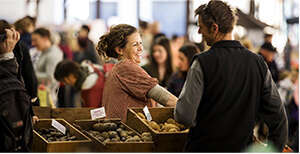
The world’s relationship with food is an ever-evolving concept. Although in the past eating may have been simply a necessary chore, today it is a far more personal affair. We have become more aware and educated as consumers, searching for quality and provenance, as well as seeking to benefit local businesses and limit our impact on the environment. Therefore, despite an ever-more-globalised world, our newly honed instinct when searching for good food is to look closer to home rather than further afield. In 2016, superior produce is defined by authenticity, sustainability and local craft.
Take the US, for example.
Locally and sustainably sourced food is among the most important restaurants trends in 2016, highly valued by more than 1,600 chefs surveyed by the National Restaurant Association – 41% of whom said it would be the fastest-growing trend in the next 10 years. Indeed, it’s a development that is visible across all sectors of the food industry.
The same trend can be seen in Europe.
Paradiset, a small two-store supermarket chain in Stockholm, offers authentic Swedish products that are responsibly obtained from local farmers, whether it’s a chicken that roamed freely during its life or beer from the nearby island of Värmdö.
In the Netherlands, UrbanFarmers is using abandoned rooftops to grow fruit and vegetables that it then delivers to local shops, restaurants and residents. Meanwhile, on the other end of the spectrum in the US, Whole Foods – whose emphasis on sustainability and authenticity has already garnered a global following – recently received more than 100 applications from regional farmers after it put out a request for local suppliers for its new Lehigh Valley branch in Pennsylvania.
As more of us make our consumer choices based on a desire to support local growers, farmers and fishermen, so too are some of the world’s most renowned restaurants. From South America to Asia, some of the best chefs working today are using ingredients they can find on their doorstep to make dishes that reflect their agricultural and culinary context – and it’s not going unrecognised.
Three years ago The World’s 50 Best Restaurants awards launched its Sustainability award to commend restaurants that were “using local, seasonal and high-welfare, and ethically sourced produce”, as well as being environmentally responsible and beneficial to their communities. The winner of the inaugural prize in 2013 – Narisawa in Tokyo, Japan – was highly praised for using “seasonal ingredients drawn from Japan’s rich pantry”. In addition to winning the sustainability prize, Narisawa was also the organisation’s highest ranked restaurant in Asia in 2013 and has been climbing ever since. Authentic, true and honest, Narisawa is one of a growing number of restaurants that have realised that what their patrons want is to see locally sourced ingredients used creatively to their fullest potential.
This is a trend that shows no sign of diminishing and, crucially, consumers are the driving force. It is the demand from consumers as responsible 21st-century citizens that has stimulated this direction in the food industry. In fact, expenditure on local food nearly doubled in the US between 2008 and 2014, according to the US Department of Agriculture. If there is one thing above all that holds true about the locally sourced food trend, then, it’s that it is not a trend at all. Our increased interest in produce that hasn’t travelled thousands of miles to reach our plates is an authentic, consumer-led movement that represents much more than a passing fad.
